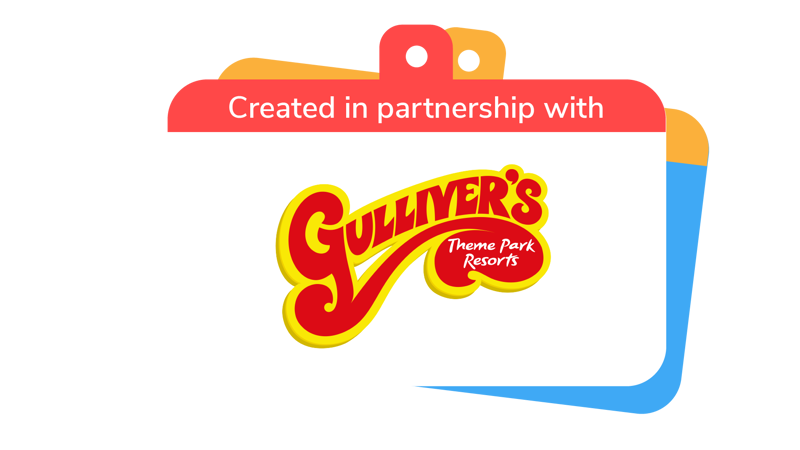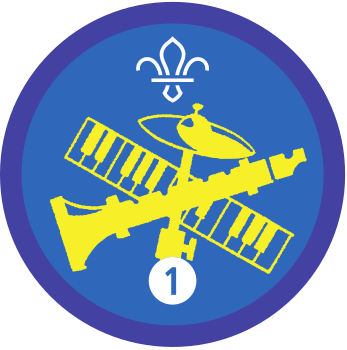
Put on a gang show
You’ll need
- Chairs
- Instruments
- Audio equipment, as needed
Try this at Gulliver's Theme Park Resorts!
Thinking of running this activity? Well, why not try it during a trip to Gulliver's Theme Park Resorts with your group. Whether you are there for a Scouts Takeover weekend, or heading out on a group visit with just your troop, this activity can be a great addition to your trip programming.
Each Gulliver's stage has a different theme, so why not incorporate it into your production!
Gulliver’s Valley Theatre: A pirate ship themed stage with lighting, large indoor seating options and space for bigger groups to put on a professional-style production
Gulliver’s World Theme Park: Starlight theatre with plenty of seating options (table and chairs). The stage has a new sound and screen system. It's perfect for groups to build their own show.
Gulliver’s Land: A traditional theatre space with rows of seating. There is no specific theme to this stage but a cosy and compact space that’s ideal for smaller groups
Gulliver’s Kingdom: Another smaller theatre/stage area that’s located within the western world section of the park. This would be a great opportunity for wild west style shows and theming.
Learn more about the partnership hereSo, you’re thinking of putting on a performance?
There’s lots to consider – performances aren’t just about earning badges, they’re a chance to bring people together and build confidence in a group.
- Before you get excited about the details, you need to nail the basics. Everyone should have their say, but you may need to think about how you’ll make the final decisions.
- First things first, decide who’ll make up your audience. You’ll need to do this before you think about your show’s venue or content. People usually invite the rest of their group as well as family members – make sure you give people plenty of warning so they can sort out the logistics. Whether you choose to invite anyone else is up to you – it’ll depend on your level of experience, the performers’ confidence, and the venue you’re thinking of using.
- If people are aiming for stage 4 or stage 5 of their Musician Staged Activity Badge, the performance should be public.
- Next up, think about the length of your show. If it’s your first time with this type of event, it may be better to keep it on the short side. Shorter shows are often easier for friends and family to attend. Think about your venue, too – do they have any time limits or other requirements?
- Of course, you’ll need somewhere to host your show! For many first (or second, or third) timers, their regular meeting place is perfect. Everyone knows how to get there, there’s not a lot of additional cost, and it’s not too scary. If you’ve got a bit more experience, you could reach out to a local venue and try to strike a deal. Many groups sort something out with local theatres so they can put on a bigger show with amazing production values. There’s no ‘best’ venue – just do what works for you. Think about how accessible your venue is too – and make sure this information is available to all your potential audience members. It’s best to include contact details in case anyone has questions, too.
- Make sure everyone’s on the same page about what they’re committing to. Shows often need lots of rehearsals so everyone’s sure what they’re doing, and it can be pretty time consuming. Everyone should agree on when they’ll rehearse, and how much time they’re signing up to give. Again, it’ll depend on the age and level of experience of everyone involved. It’s best not to expect first time performers to be as dedicated (or as focused) as people who’ve been doing it for years.
- Finally, think about who you could ask for help and advice. You’re not in this alone – plenty of people have run great shows and they’re usually happy to share advice and tips. Local businesses, such as theatres or even costume hire places, may be happy to lend a hand too. Don’t forget to say thanks afterwards.
Shows aren’t just about the performers. The best shows have roles for everyone who wants to be involved. People could take responsibility for promoting the show (think posters, flyers, and other creative ideas), decorating the venue, or keeping everything running smoothly on the night.
Struggling for ideas? Here are some suggested roles:
- Promoters. Perfect for budding artists, graphic designers, and creative thinkers. Posters and leaflets can help build an atmosphere and advertise the show to a wider audience. A show’s not a show if no one knows it’s happening.
- Logistics managers. Without a plan (and people to make sure everyone sticks to it) the best-intentioned shows can descend into chaos. This one’s for the planners, the detail-focused, and the Post-it note lovers. They’ll make sure nothing's out of place and every prop and person is where they’re supposed to be.
- Lighting gurus. They may not be centre stage, but they’ve got a lot of power (and we’re not just talking about the electricity). Lighting can affect the mood of the room, and tell the audience when to shush, when to clap, and when it’s time for the all-important interval. This one’s for the engineers, the colourful creatives, and the tech nerds.
- Directors. Don’t overlook the quiet thinkers for this role – the best directors are the ones with a keen eye for detail, the ability to put themselves in someone else’s shoes, and a creative streak. They’ll help figure out how the show will look and input into the structure too. On the big day, they’ll work with the logistics managers to make sure everything runs to time. However amazing your show is, people will want to go home eventually.
- Runners. The real heroes – without them, the show couldn’t go on. This is for anyone who’s not afraid to work hard and get their hands dirty even if it doesn’t end in the spotlight. Runners may end up helping the directors, logistics managers, or lighting gurus – they’ll need to be ready to lend a hand, but should always be treated with respect.
- Compere or presenter. Perfect for those who aren’t musically minded but are still keen to be in the spotlight. They’ll need to welcome the audience, introduce each performer, and finish up the night. It’s up to the compere how they play it – they may be funny, or they may choose to let the musicians be the big personalities. This is a perfect role for people to share – and if no one’s keen, that’s OK too. A leader can always pick up the baton (though we think young people make the best stars).
- Not every part of the show needs to be a big challenge. It’s OK to include some well-known tunes, as well as something for kids, if you think that it’ll suit your audience. Why not give the audience the chance to join in with songs everyone knows? You could use campfire tunes, for example, from an activity such as Sing like a camel.
- Think about whether you’ll have an interval. They’re pretty essential in longer shows – the audience will want to stretch their legs, grab a drink or snack, and pop to the loo.
- If you’re lucky enough to have lots of willing performers, you’ll probably find that they’re at different levels. Make sure everyone has a fair chance to show their talents (even if the more experienced performers have longer or more complex pieces). You may want to start with the less experienced performers and build it up, or you may want to keep it varied. It’s up to you – but think about the order of the performance.
- With so many talented performers in one place, it’d be a shame not to work together to create something really impressive. Group performances are also required for stages four and five of the Musician Staged Activity Badge. It’s up to you whether you wait for the end or scatter a few group pieces throughout.
- Don’t be surprised if people call for an encore – it just means they enjoyed the show so much they want to see more. It’s usually easier to make encores work if you have space for performers to gather backstage and control over the lights. You may want to finish a little earlier than you need to so there’s time– the compere or presenter could ask the audience if they want more if it doesn’t happen spontaneously. It’s up to you whether the encore is a new piece or just a repetition of something from earlier. Whatever you choose, find a role for everyone who wants to be involved.
- Mark the end of the performance clearly; it’s nice for all the performers to come back on stage for a final bow. Before the audience starts to leave, the compere or presenter should thank everyone for coming and playing their part in the success of the evening. Don’t forget to congratulate everyone behind the scenes who made it happen, as well as the performers – the people outside the spotlight are every bit as important as those on stage.
Reflection
Staged performances are all about developing skills. Which skills did people develop in their role? Did everyone involved in the show use the same skills? Not everyone has the same talents, and that’s OK. To earn a top award, people need four to six Activity (or Staged Activity) badges. There are plenty to choose from, so there’s something for everyone. Can anyone think of a skill everyone involved in the performance had? Perhaps everyone had to think on their feet when things didn’t go to plan, or put themselves in someone else’s shoes when it came to disagreements and creative differences.
This was also a chance to try new things. Did anyone take on a new role? How did people feel as their part approached? If they did another show, would people like to try any other roles?
Safety
All activities must be safely managed. You must complete a thorough risk assessment and take appropriate steps to reduce risk. Use the safety checklist to help you plan and risk assess your activity. Always get approval for the activity, and have suitable supervision and an InTouch process.
You must always:
- Complete a risk assessment
- Have the right ratios of number of adults to provide suitable supervision
- Set up an InTouch process
- Know what to do in an emergency
- Share information with parents and carers with an activity information form
- Get approval from your Lead Volunteer.
Performance:
- Get approval from your Lead Volunteer to perform in public
- Follow the assessment criteria in the relevant toolkit
Joint activities with other organisations:
- This activity can be run jointly with Girlguiding.
- This activity can be run with other organisations.
This activity can be led by you or someone else in Scouts
You can go to a centre or use an activity leader who is not part of Scouting:
You must find a suitable provider who meets the following requirements:The provider must have public liability insurance.
There are plenty of ways to keep a show simple, and just as many to turn up the challenge. Keep in touch with everyone involved, to make sure their roles are challenging but fun – no one should feel overwhelmed, and responsibility should be shared fairly.
The best performances have jobs for everyone, whether they’re on stage or not (although only the performers will get their Musician Staged Activity Badge). Anyone who uses sign language could look into performance interpreting. Remember, badge requirements can be adapted to suit each young person.
All Scout activities should be inclusive and accessible.
After their success with a show, young people may want to find out more about gang shows. They could get stuck in to one that’s already happening, or even start up their own.
Shows can also be a great fundraising opportunity, whether you’re looking to raise money for your group or another charitable cause. If that’s your goal, you’ll probably need some fundraising specific roles.
Young people should be involved in the planning as well as the performing. They should shape not just the music, but the entire structure of the performance.





